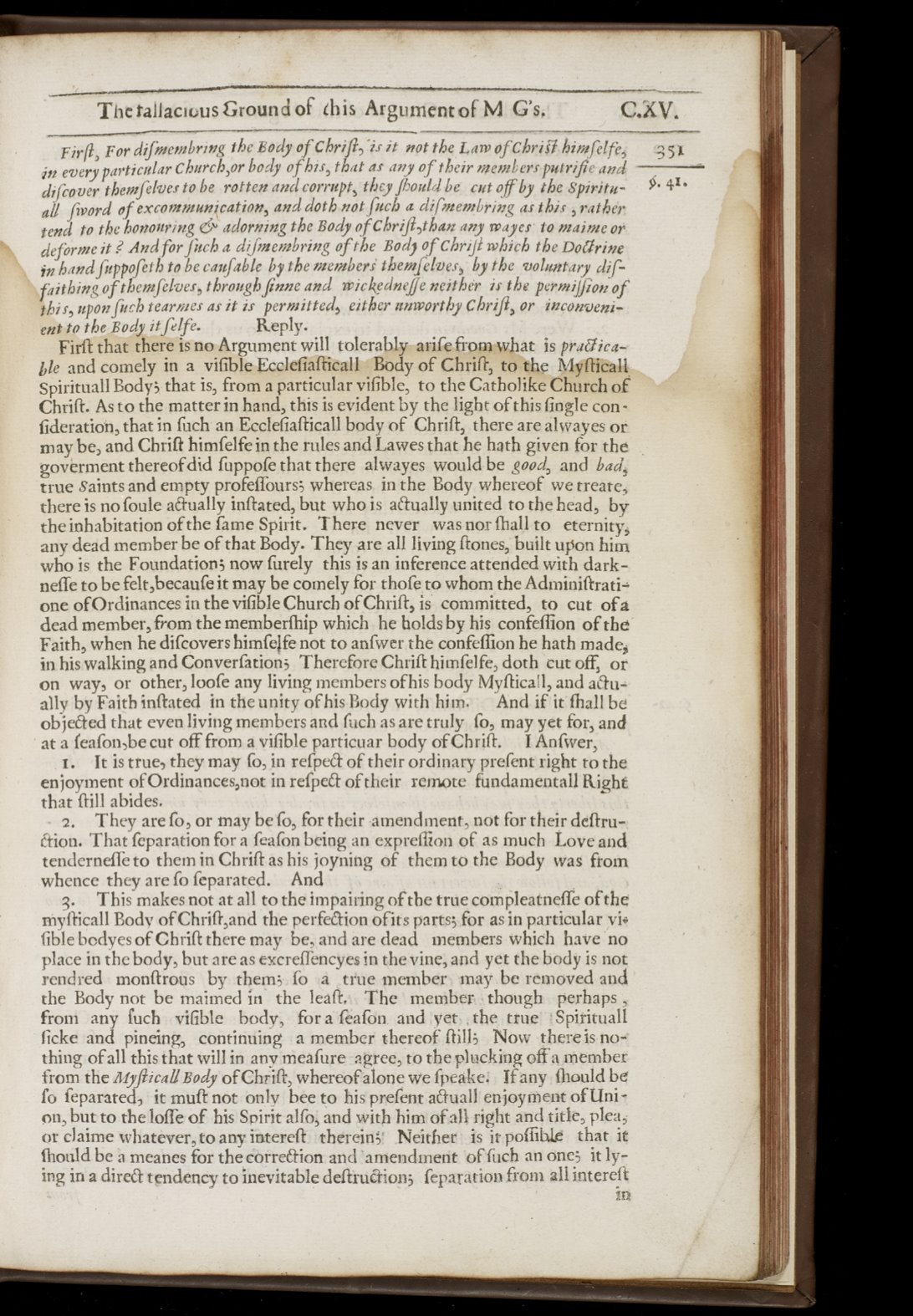

The tallacocusGroundof this Argument
of
M G's.
C.XV.
Fir
For difinembring the
Body
of
chrifl,
"is
it
not
the
Law
ofChrisi
himfelfe;
in
every
particular church,or
body
of
his,
that
as
any
of
their
members
putrifie
and
difcover
themfelves
to be
rotten and
corrupt, they fhould be cut
of
by
the
spiritu-
al'
fword
of
excommun{cation,
and
doth
notfuch
a
difinembring
as
this
,rather
tend
to the honouring
&
adorning the
Body
of
Chrifl,than
any
?payer
to
maime or
deforme
it
?
And
for
fuch
a difinembring
of
the
Body
of
Chrift which the
Doarine
in
hand
fuppofeth
to be
caufable
by
the
members'
themfelves,
by
the voluntary
dif-
f
aithing
of
themfelves, through
fnne
and
wicltednefJe
neither is
the
permion of
this,
upon
fuch
tearnaes as
it
is
permitted, either
unworthy
Chrifi, or inconveni-
ent
to
the
Body
itfelfe.
Reply.
Firft
that
there
is
no Argument
will
tolerably
arife from what
is
praelica-
ble
and comely
in a
vifible Ecclefiafticall Body
of
Chrift, to
the
Myfticall_
Spiritual] Body;
that
is
from
a
particular
vifible,
to the
Catholike Church
of
Chrift.
As
to
the matter
in
hand, this
is
evidentby the light
of
this tingle
con.
fideration,
that
in
fuch an Ecclefiafticall
body
of
Chrift, there are alwayes
or
may
be, and
Chrift himfelfe
in
the
rules
and
Lawes
that
he hath given for
the
goverment thereofdid
fuppofe
that
there
alwayes
would
be
good,
and bad,
true
saints
and empty profeffours; whereas
in
the
Body
whereof
we
treater
there
is
no foule
a
&ually
inftated,
but
who
is a&ually
united
to
the head, by
the
inhabitation
of
the
fame Spirit.
There
never
was
nor
Ihall
to
eternity]
anydead member be
of
that
Body.
They
are
all
living (tones,
built upon him
who
is
the Foundation; now
Cutely
this
is
an
inference
attended
with
dark -
nefíe
to
be felt,becaufeit may be
comely for
thole
to
whom theAdininiftrati-
one
ofOrdinances
in
the
vifible
Church
ofChrift,
is
committed,
to
cut
ofa
dead member,
from
the
memberfhip which he holds by
his
confe(iion
of
the
Faith,
when he dilcovers
himfelfe
not to
anfwer
the
confefiion
he hath made,
in
his
walking andConverfation;
Therefore
Chrift
himfelfe,
doth cut
off,
or
on way, or
other,
bofe
any living
members ofhis body
Myfticall,
and
a&u=
ally
by
Faith inftated
in
the unity
of
his
Body
with
him. And
if
it
(hall
be
obje&ed
that
even living members and
fuch
as
are truly
fo, may yet for,
and
at
a
feafon,be cut
off
from
a
vifible
particuar body ofChrift.
I
Anfwer,
I.
It
is
true,
they may
fo,
in
refpe&
of
their ordinary
prefent
right
to the
enjoyment ofOrdinances,not
in refpe&
of
their remote fundamental)
Right
that
(till abides.
2.
They
are
fo,
or
may befo, for
their amendment,not
for
their deftru-
etion.
That
feparationfor
a
feafon
being
an exprefhon
of
as
much
Love and
tenderneffe
to
them
in
Chrift
as
his
joyning
of
them
to
the
Body was
from
whence
they are
fo
feparated.
And
3.
This
makes
not
at all
to
the
impairing
of
the true
compleatneffe
of
the
myfticall Body
ofChrift,and the
perfe
&ion
ofiis
parts;
for
as in
particular
vi>
fible
bodyes
of
Chrift there
may be, and are
dead
members which have
'no
place in
the body, but
are
as
excreffencyes in
the
vine, and yet
the
body
is
not
rendred
monftrous by
them;
.
fo
a
true
member
may be removed and
the
Body
not
be
maimed
in
the
Ieaft.
The
member though
perhaps
,
from any
fuch
vifible
body, for
a
Ceafou
and
yet
;
the
true
.Spiritual)
ficke
and pineing, continuing
a
member
thereof
Rill;
Now there
is
no-
thing
of
all
this
that
will in any
meafure agree, to
the
plucking
off
a
member
from the Myticall
Body
ofChrift, whereof
alone we fpeake,
If
any fhould
be
fo
feparated,
it
muff
not
only bee
to
his
prefent
a&uall
enjoyment
of
Ifni-
on, but to the
lofie
of
his
Spirit allo, and with him
of
all right
and
title,
plea;
or
claime
whatever,
to
any
intereft therein;' Neither
is
it polka
e
that
it
fhould be
a
meanes
for the correftion and amendment
of
Inch an
one;
it
ly-
ing in
a
dire&
tendency to inevitable deftru
&ion;
feparation from all intereft
35r
4.
4"










